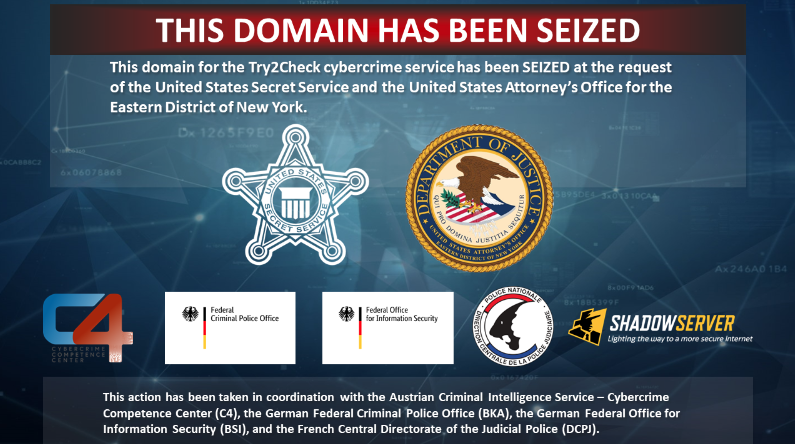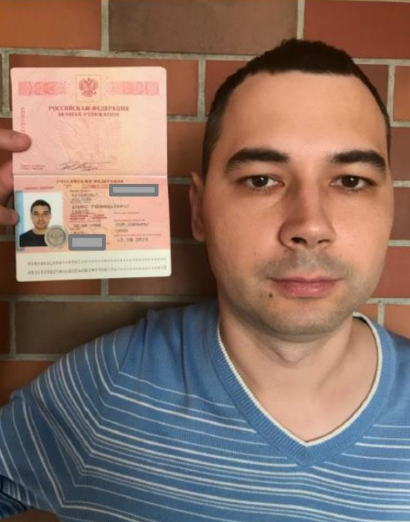[ad_1]
The U.S. authorities this week put a $10 million bounty on a Russian man who for the previous 18 years operated Try2Check, one of many cybercrime underground’s most trusted providers for checking the validity of stolen bank card information. U.S. authorities say 43-year-old Denis Kulkov‘s card-checking service made him at the very least $18 million, which he used to purchase a Ferrari, Land Rover, and different luxurious objects.

Denis Kulkov, a.okay.a. “Nordex,” in his Ferrari. Picture: USDOJ.
Launched in 2005, Try2Check quickly was processing greater than one million card-checking transactions per thirty days — charging 20 cents per transaction. Cybercriminals turned to providers like this after buying stolen bank card information from an underground store, with an eye fixed towards minimizing the variety of playing cards which might be inactive by the point they’re put to felony use.
Try2Check was so dependable that it will definitely grew to become the official card-checking service for among the underground’s most bustling crime bazaars, together with Vault Market, Unicc, and Joker’s Stash. Prospects of those carding outlets who selected to make use of the store’s built-in (however a-la-carte) card checking service from Try2Check may anticipate computerized refunds on any playing cards that have been discovered to be inactive or canceled on the time of buy.
Many established stolen card outlets will permit prospects to request refunds on useless playing cards primarily based on official studies from trusted third-party checking providers. However basically, the larger outlets have steered prospects towards utilizing their very own white-labeled model of the Try2Check service — primarily to assist reduce disputes over canceled playing cards.
On Wednesday, Could 3, Try2Check’s web sites have been changed with a site seizure discover from the U.S. Secret Service and U.S. Division of Justice, as prosecutors within the Japanese District of New York unsealed an indictment and search warrant naming Denis Gennadievich Kulkov of Samara, Russia because the proprietor.

Try2Check’s login pages have been changed with a seizure discover from U.S. legislation enforcement.
On the identical time, the U.S. Division of State issued a $10 million reward for data resulting in the arrest or conviction of Kulkov. In November 2021, the State Division started providing as much as to $10 million for the identify or location of any key leaders of REvil, a serious Russian ransomware gang.
As famous within the Secret Service’s felony grievance (PDF), the Try2Check service was first marketed on the closely-guarded Russian cybercrime discussion board Mazafaka, by somebody utilizing the deal with “KreenJo.” That deal with used the identical ICQ instantaneous messenger account quantity (555724) as a Mazafaka denizen named “Nordex.”
In February 2005, Nordex posted to Mazafaka that he was available in the market for hacked financial institution accounts, and supplied 50 % of the take. He requested companions to contact him on the ICQ quantity 228427661 or on the electronic mail deal with polkas@bk.ru. As the federal government famous in its search warrant, Nordex exchanged messages with discussion board customers on the time figuring out himself as a then-24-year-old “Denis” from Samara, RU.
In 2017, U.S. legislation enforcement seized the cryptocurrency alternate BTC-e, and the Secret Service stated these data present {that a} Denis Kulkov from Samara provided the username “Nordexin,” electronic mail deal with nordexin@ya.ru, and an deal with in Samara.
Investigators had already discovered Instagram accounts the place Kulkov posted footage of his Ferrari and his household. Authorities have been capable of determine that Kulkov had an iCloud account tied to the deal with nordexin@icloud.com, and upon subpoenaing that discovered passport photographs of Kulkov, and properly as extra photographs of his household and expensive automobiles.
Like many different prime cybercriminals primarily based in Russia or in international locations with favorable relations to the Kremlin, the proprietor of Try2Check was not significantly troublesome to hyperlink to a real-life id. In Kulkov’s case, it little doubt was vital to U.S. investigators that they’d entry to a wealth of private data tied to a cryptocurrency alternate Kulkov had used.
Nevertheless, the hyperlink between Kulkov and Try2Check may be made — satirically — primarily based on data which were plundered by hackers and printed on-line through the years — together with Russian electronic mail providers, Russian authorities data, and hacked cybercrime boards.
NORDEX

Kulkov posing along with his passport, in a photograph authorities obtained by subpoenaing his iCloud account.
In keeping with cybersecurity agency Constella Intelligence, the deal with polkas@bk.ru was used to register an account with the username “Nordex” at bankir[.]com, a now defunct information web site that was nearly commonplace studying for Russian audio system fascinated by information about numerous Russian monetary markets.
Nordex seems to have been a finance nerd. In his early days on the boards, Nordex posted a number of lengthy threads on his views concerning the Russian inventory market and mutual fund investments.
That Bankir account was registered from the Web deal with 193.27.237.66 in Samara, Russia, and included Nordex’s date of start as April 8, 1980, in addition to their ICQ quantity (228427661).
Cyber intelligence agency Intel 471 discovered that Web deal with additionally was used to register the account “Nordex” on the Russian hacking discussion board Exploit again in 2006.
Constella tracked one other Bankir[.]com account created from that very same Web deal with beneath the username “Polkas.” This account had the identical date of start as Nordex, however a distinct electronic mail deal with: nordia@yandex.ru. This and different “nordia@” emails shared a password: “anna59.”
NORDIA
Nordia@yandex.ru shares a number of passwords with nordia@record.ru, which Constella says was used to create an account at a spiritual web site for an Anna Kulikova from Samara. On the Russian dwelling furnishing retailer Westwing.ru, Ms. Kulikova listed her full identify as Anna Vnrhoturkina Kulikova, and her deal with as 29 Kommunistrecheskya St., Apt. 110.
A search on that deal with in Constella brings up a file for an Anna Denis Vnrhoturkina Kulkov, and the cellphone quantity 879608229389.
Russian automobile registration data have additionally been hacked and leaked on-line through the years. These data present that Anna’s Apt 110 deal with is tied to a Denis Gennadyvich Kulkov, born April 8, 1980.
The automobile Kolkov registered in 2015 at that deal with was a 2010 Ferrari Italia, with the license plate quantity K022YB190. The cellphone quantity related to this file — 79608229389 — is strictly like Anna’s, solely minus the (mis?)main “8”. That quantity is also tied to a now-defunct Fb account, and to the e-mail addresses nordexin@ya.ru and nordexin@icloud.com.
Kulkov’s Ferrari has been photographed quite a few occasions through the years by Russian automotive aficionados, together with this one with the driving force’s face redacted by the photographer:

The Ferrari owned by Denis Kulkov, noticed in Moscow in 2016. Picture: Migalki.web.
Because the title of this story suggests, the exhausting half for Western legislation enforcement isn’t figuring out the Russian cybercriminals who’re main gamers within the scene. Relatively, it’s discovering inventive methods to seize high-value suspects if and once they do depart the safety that Russia usually extends to home cybercriminals inside its borders who don’t additionally hurt Russian firms or customers, or intervene with state pursuits.
However Russia’s warfare towards Ukraine has triggered main fault traces to look within the cybercrime underground: Cybercriminal syndicates that beforehand straddled Russia and Ukraine with ease have been compelled to reevaluate many comrades who have been instantly working for The Different Aspect.
Many cybercriminals who operated with impunity from Russia and Ukraine previous to the warfare selected to flee these international locations following the invasion, presenting worldwide legislation enforcement companies with uncommon alternatives to catch most-wanted cybercrooks. A type of was Mark Sokolovsky, a 26-year-old Ukrainian man who operated the favored “Raccoon” malware-as-a-service providing; Sokolovsky was apprehended in March 2022 after fleeing Ukraine’s necessary army service orders.
Additionally nabbed on the lam final 12 months was Vyacheslav “Tank” Penchukov, a senior Ukrainian member of a transnational cybercrime group that stole tens of hundreds of thousands of {dollars} over practically a decade from numerous hacked companies. Penchukov was arrested after leaving Ukraine to satisfy up along with his spouse in Switzerland.
[ad_2]